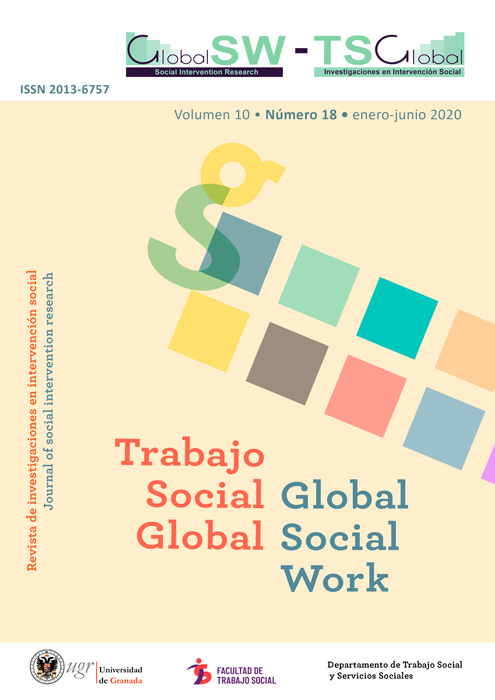Ruptura familiar judicializada y prescripción de intervención familiar desde el Trabajo Social Forense: factores confluyentes
DOI:
https://doi.org/10.30827/tsg-gsw.v10i18.9543Palabras clave:
Ruptura familiar, Trabajo Social Forense, pericial, intervención familiar, comunicación.Resumen
La ruptura familiar cuando hay hijas/os menores de edad, entraña, en cualquier caso, una gran dificultad para sus miembros. Cuando sobreviene en familias cuya dinámica relacional está muy dañada, por presencia de factores personales y socio-ambientales negativos y/o habilidades comunicacionales disfuncionales, las posibilidades de que se judicialice y cronifique son muy altas.
Este trabajo pretende abordar cómo evolucionan este tipo de casos, una vez que pasan por el sistema judicial, son valorados por un equipo técnico y en el informe social pericial emitido desde el TSF (Trabajo Social Forense) se concluye la necesidad de que el grupo familiar se someta a un proceso de intervención que vele por el interés superior de las/los menores y ayude a los padres en la adquisición de habilidades de parentalidad positiva. La metodología parte de la selección de una muestra de la práctica del TSF, seguida de una recopilación de datos participada por los sujetos implicados, de cuyo análisis emergen factores explicativos de por qué las intervenciones no se implementan mayoritariamente.
Descargas
Citas
Aguilar, M. J. (2013). Trabajo social. Concepto y Metodología Madrid: Paraninfo y Consejo General del Trabajo Social.
Ariño, M. (2008). Análisis conversacional, de contenido y de discurso. En C. Guinot (Coord.) Métodos, técnicas y documentos utilizados en Trabajo Social. (pp.79-90). Universidad de Deusto: Temas de Trabajo Social, núm.6.
García, A., López, A. y Novillo, B. (2018). La Coordinación Parental, rol del Trabajador/a Social. Colegio Oficial de Trabajo Social de Madrid, 1-10. Recuperado de http://www.comtrabajosocial.com/documentos.asp?id=2703
Krmpotic, C. S. (2013). El Trabajo Social Forense como campo de actuación en el arbitraje de lo social. Trabajo Social Global. Revista de Investigaciones en Intervención Social, 3 (4), 37-54. Recuperado de
http://revistaseug.ugr.es/index.php/tsg/article/view/957
Martín Algarra, M. (2003). Teoría de la comunicación: una propuesta. Madrid: Tecnos.
Piñuel, J.L. y Gaitán, J.A. (1995). Metodología general. Conocimiento científico e investigación en la comunicación social. Madrid: Síntesis.
Programa de Infancia y Familia, Instituto Municipal de Servicios Sociales de Badajoz. Recuperado de https://www.aytobadajoz.es/es/imss/el-imss/familia
Ruiz, P. (2003). El trabajador social como perito judicial. Zaragoza: Libros Certeza.
______ (2013). El trabajador social forense en los tribunales españoles. Málaga: Colegio Oficial de Trabajadores Sociales de Málaga.
Simón, M. (2016). Como evaluar las secuelas y lesiones sociales a víctimas de violencia de género. Criterios, dimensiones, indicadores. En D. Carbonero, E. Raya, N. Caparrós, Ch. Gimeno (Coord.). Respuestas transdisciplinares en una sociedad global: Aportaciones desde el Trabajo Social. Logroño: Universidad de la Rioja.
Soto, R. (2016). La pericial socio familiar ante el foro judicial. En M. J. Mateos y L. Ponce-León (Coords.). El trabajo social en el ámbito judicial (pp. 99-109). Madrid: Colegio Oficial de Trabajadores Sociales de Madrid, Colección I Trabajo Social Hoy.
Descargas
Publicado
Cómo citar
Número
Sección
Licencia
Las personas autoras que publican en esta revista están de acuerdo con los siguientes términos:
- Las personas autoras conservan los derechos de autoría, garantizando a Trabajo Social Global-Global Social Work el derecho a la primera publicación del trabajo que remiten a la revista para que sea sometido al preceso editorial.
- Autores y autoras conocen que su obra se publica bajo una Licencia Creative Commons que permite a otros compartirla con un reconocimiento de la autoría del trabajo y de su publicación inicial en esta revista.
- Los/as autores/as ceden a Trabajo Social Global-Global Social Work los derechos de explotación de la obra que haya sido publicada en esta revista, autorizando a la Editorial de la misma para el ejercicio de una libre reproducción, distribución y comunicación pública. Autores y autoras conocen que su obra será almacenada en servidores y reproducida en soporte digital para su incorporación a repositorios institucionales y bases de datos que facilitarán el acceso libre y gratuito al texto completo de la obra.
- Los/as autores/as pueden distribuir la versión post-print de la obra publicada en TSG-GSW (por ejemplo, situarlo en un repositorio institucional o publicarlo en un libro), con un reconocimiento expreso de su publicación inicial en esta revista.
Los derechos de copyright sobre los textos publicados en Trabajo Social Global-Global Social Work, así como la política editorial de la misma respecto al auto-archivo o depósito en repositorios institucionales o temáticos, están identificados en la base de datos Dulcinea.






















